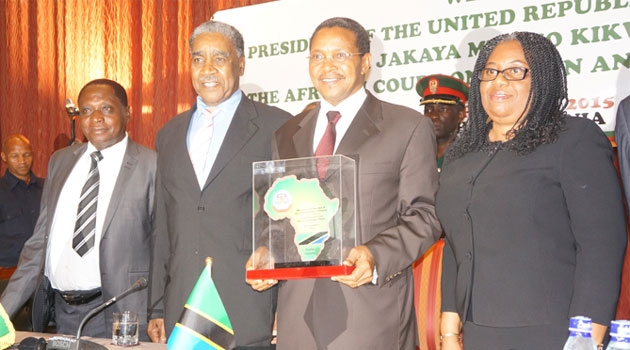
Kikwete said the court, based in Arusha, is quickly gaining popularity, having received 50 contentious applications, 17 out of which have been received this year alone/CFM
Kikwete said the court, based in Arusha, is quickly gaining popularity, having received 50 contentious applications, 17 out of which have been received this year alone.
“This court has recorded tremendous achievements in just a decade of its existence,” Kikwete said, “It has lived up to its mandate and to the satisfaction of the member states”.
The court which received accolades from leaders at the recent African Union meeting is headed by Justice Augustine Ramadhani.
“Never did I witness a fellow Head of State condemning the work of the court at the AU summit during discussions on the report of the work of this court,” Kikwete said Thursday in Arusha when he launched the court’s Swahili version of the Basic Facts Booklet.
Justice Ramadhani said the translation of the court’s Basic Facts Booklet was aimed at ensuring proper understanding of the court’s operations.
“We have done so for the sake of further promoting the court in the Swahili speaking world,” he said.
President Kikwete recalled sentiments of African leaders at the summit where they called for the “empowerment of the “court to deal with cases of international criminal justice which occur in Africa. Instead of referring such cases to the International Criminal Court (ICC) they should be referred to this court.”
Tanzania has already donated $100,000 for a legal aid scheme aimed at helping applicants who cannot afford legal fees to access justice.
In a span of a decade, the protocol which established the court has been ratified by 29 out of 54 AU member states.
7 States (Burkina Faso, Cote d’ Ivoire, Ghana, Malawi, Rwanda and Tanzania) have already declared recognition of the competence of the court.
Of the 50 applications received by the court so far, 34 of them have been filed against seven states. Twenty two of them against Tanzania, five against Rwanda, two against Burkina Faso, two against Cote d’ Ivoire while Malawi and Mali have got one each. The court has also received eight requests for advisory opinion.
During Thursday’s occasion, Kikwete urged the African court to lobby, through sensitisation and road shows, for the 26 countries that have not ratified the protocol for the establishment of the court to do so. He said the court should also encourage those 21 countries which have ratified but yet to recognize the competence of the court to do so.
Certainly, he said, “you will need the support of member states who have already done both or one of the two. Tanzania stands ready to support you in this noble endeavour.”
Kikwete is serving his second and final term as Tanzania’s president, with campaigns intensified by contenders keen to take over from him in next month’s polls.
“I will be leaving office satisfied that the court is on a sound footing in Tanzania. More so, that the preparations for the construction of the permanent court premises have started and they are at advanced stages. It gives me hope that the future of this court is bright and promising,” he said.









































